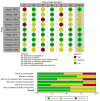Antimicrobial Prophylaxis Reduces the Rate of Surgical Site Infection in Upper Gastrointestinal Surgery: A Systematic Review
- PMID: 35203832
- PMCID: PMC8868284
- DOI: 10.3390/antibiotics11020230
Antimicrobial Prophylaxis Reduces the Rate of Surgical Site Infection in Upper Gastrointestinal Surgery: A Systematic Review
Abstract
Surgical site infection occurs with high frequency in gastrointestinal surgery, contributing to the high incidence of morbidity and mortality. The accepted practice worldwide for the prevention of surgical site infection is providing single- or multiple-dose antimicrobial prophylaxis. However, most suitable antibiotic and optimal duration of prophylaxis are still debated. The aim of the systematic review is to assess the efficacy of antimicrobial prophylaxis in controlling surgical site infection rate following esophagogastric surgery. PubMed and Cochrane databases were systematically searched until 31 October 2021, for randomized controlled trials comparing different antimicrobial regimens in prevention surgical site infections. Risk of bias of studies was assessed with standard methods. Overall, eight studies concerning gastric surgery and one study about esophageal surgery met inclusion criteria. No significant differences were detected between single- and multiple-dose antibiotic prophylaxis. Most trials assessed the performance of cephalosporins or inhibitor of bacterial beta-lactamase. Antimicrobial prophylaxis (AMP) is effective in reducing the incidence of surgical site infection. Multiple-dose antimicrobial prophylaxis is not recommended for patients undergoing gastric surgery. Further randomized controlled trials are needed to determine the efficacy and safety of antimicrobial prophylaxis in esophageal cancer patients.
Keywords: antimicrobial prophylaxis; esophageal surgery; gastric surgery; surgical site infection.
Conflict of interest statement
The authors declare no conflict of interest.
Figures
References
Publication types
LinkOut - more resources
Full Text Sources
Miscellaneous



